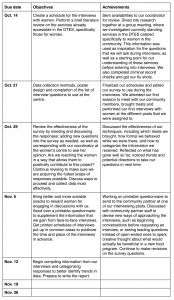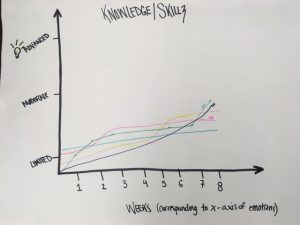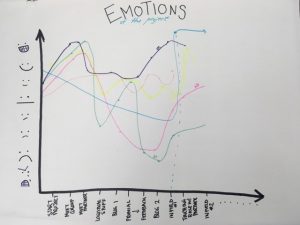Weekly objectives and achievements

We think of the commencing of the project as a major achievement – after all our administrative work and planning we were finally able to ‘begin’ our project this week. It is exciting because all of the work prior to these interview sessions prepared us well. Beginning the project was a huge advance because we were able to tweak with the way we handle situations with patrons to receive a better understanding of what they want from a food program. When interacting with patrons, some of us were reminded of the privilege we hold in society in our university bubble, which is important to reflect on. Although our interview sessions may not have been as successful as they could be in our first sessions – as we did not interview as many women as we had hoped to – it is a learning process and we learned a lot this week on how to improve future sessions. We plan to improve future sessions by bringing more snacks and also by working with our community partner to set up posters advertising when we will be around for these sessions if people would like to state their opinions on a new food program.
These past few weeks have been filled with slow and progressive learning about the aspects of the food system that women experience. Although some of our group members had a lag at the beginning of their session, the meeting with the coordinator provided them with a lot of insights and helped to clear up their last confusion. She also gave them some ideas of how to approach women. For example, she suggested to create a ‘if’ scenario instead of asking people directly on their opinion for the food program, as well as some ‘conversation starters’ to casually invite women to participate. In addition, we noticed that the staffs of women’s drop-in centre are not aware of the coming food program which we found quite surprising. Although writing blog posts and doing research may increase some skills, actually being immersed in the community and interacting with community partners in person has proved to teach some of us the most – as they are the most knowledgeable in how to work within their community. We were interested in their missions, values, and visions, and how they combine these when providing services and resources to the women.
We also found that speaking with women at the different centres gave us significantly varied and wide-reaching information. Not only have we received information on specifically what we need to know for this project, we were also told about what it feels like to be a woman trying to access gender-neutral services in the area, some unexpected ways that women find food that we did not know existed before, demographically specific issues surrounding food access, things that women gain from accessing food programs that are not food related, as well as issues that arise from the current food system they participate in that have social repercussions. Some of the group members’ sessions were very emotionally charged and contained information that we did not ask for but were humbled to receive.
Moment of significant change


During this week’s tutorial, we were able to reflect on our changes in emotions, skills, and knowledge through graphing. The emotions graph looked at different stages in our project, and how we felt throughout them. The knowledge and skills graph looked at how much we learned in each week. We did this individually first, and then compared our thoughts with our group members. It was interesting to see the different perspectives each team member had during different times of the term. Overall, we seemed to have similar attitudes and emotions. We were most excited when meeting our community partner, and when we started visits and interviews. We collectively felt the most frustrated during the proposal writing process. While it was difficult to hear constructive feedback after feeling like we did a good job, it was beneficial to our project to have more time and space to go over our proposal during the revision process, and overall we felt more prepared as a result of the feedback.
The tutorial allowed us to reflect on exactly where we felt the most successful in our path so far. It seems like the moments of certainty were the most helpful for our confidence in the project. Certainty was vastly enhanced when discussing things with the community partner directly, and when we were actively interviewing women, because things that were working could be corrected immediately and things that were not working could be abandoned on the spot. While planning for our project, predicting what would work was much more difficult to do and left us feeling uneasy. Recognizing this is helpful for the future because we will be able to take direct steps to gaining more certainty by talking with our community partner instead of wondering things and discussing things only among ourselves. Also, knowing that we do not need to be perfectly prepared for every single interview helped our emotional situation; the space to adjust and come back better prepared was given to us structurally, by splitting our interviews up into separate sessions. We now know that we are capable of adjusting to the circumstances we find ourselves in to complete our objective, which increased our situation-specific self-efficacy, allowing us to act feeling like we have a good chance of success and take more risks in the future.
The graceful dismount
We have had our ups and downs, our administrative work and our first interview sessions, but we think that one thing that we have realized through the dry parts of the process, is that our hard work pays off. We may not have gotten copious amounts of input from the women yet, but we also realize that what we have more time to gather it, and that if we continue to work and learn from our experiences, we will finish our sessions with more than enough information to use to write our report. With only one month left in our projects, our strategy is to continue this project with the same hard work, support for each other, and positive attitudes we have had so far in order to feel accomplished by the term end – which to us, means actually contributing to a successful food program for our community partner. Our group follows strict deadlines and always aims to finish our work early. Everyone submits their work on time and everyone is willing to do extra work if it is necessary (e.g. editing, researching). In addition, we communicate with each other and our community partners on a regular basis and discuss our project openly. We listen to advice and make changes accordingly. With the strong desire to do well and the ability to be flexible, we will be entering into the final stages of our project on a good foot. We must ensure that communication is kept open and that the path that results in the most effective outcome is identified and taken when it arises, with openness and a good attitude. We are excited to get started on the analysis and creative aspects of writing our final report, which will include recommendations and a synthesis of knowledge, as well as a great deal of thoughtfulness.